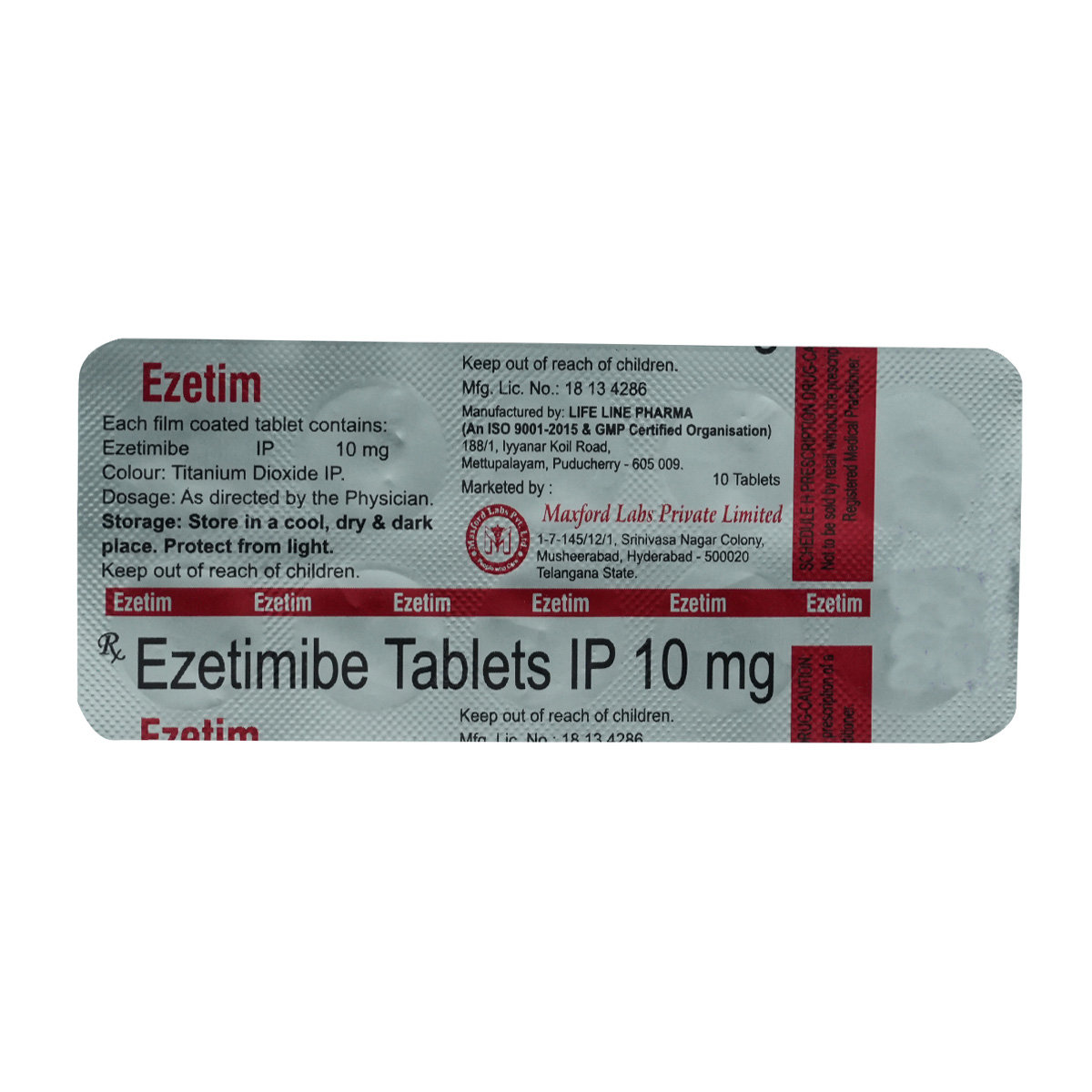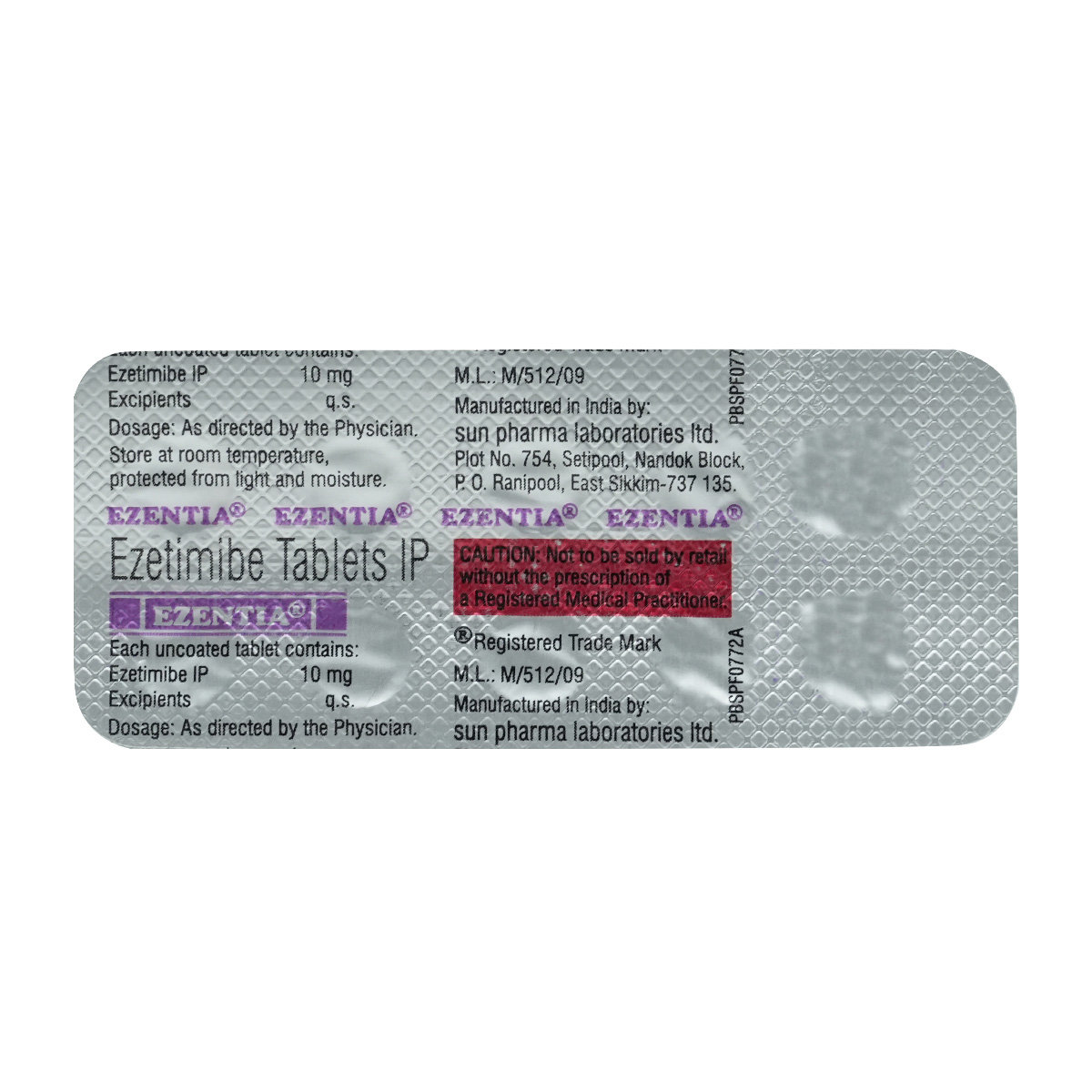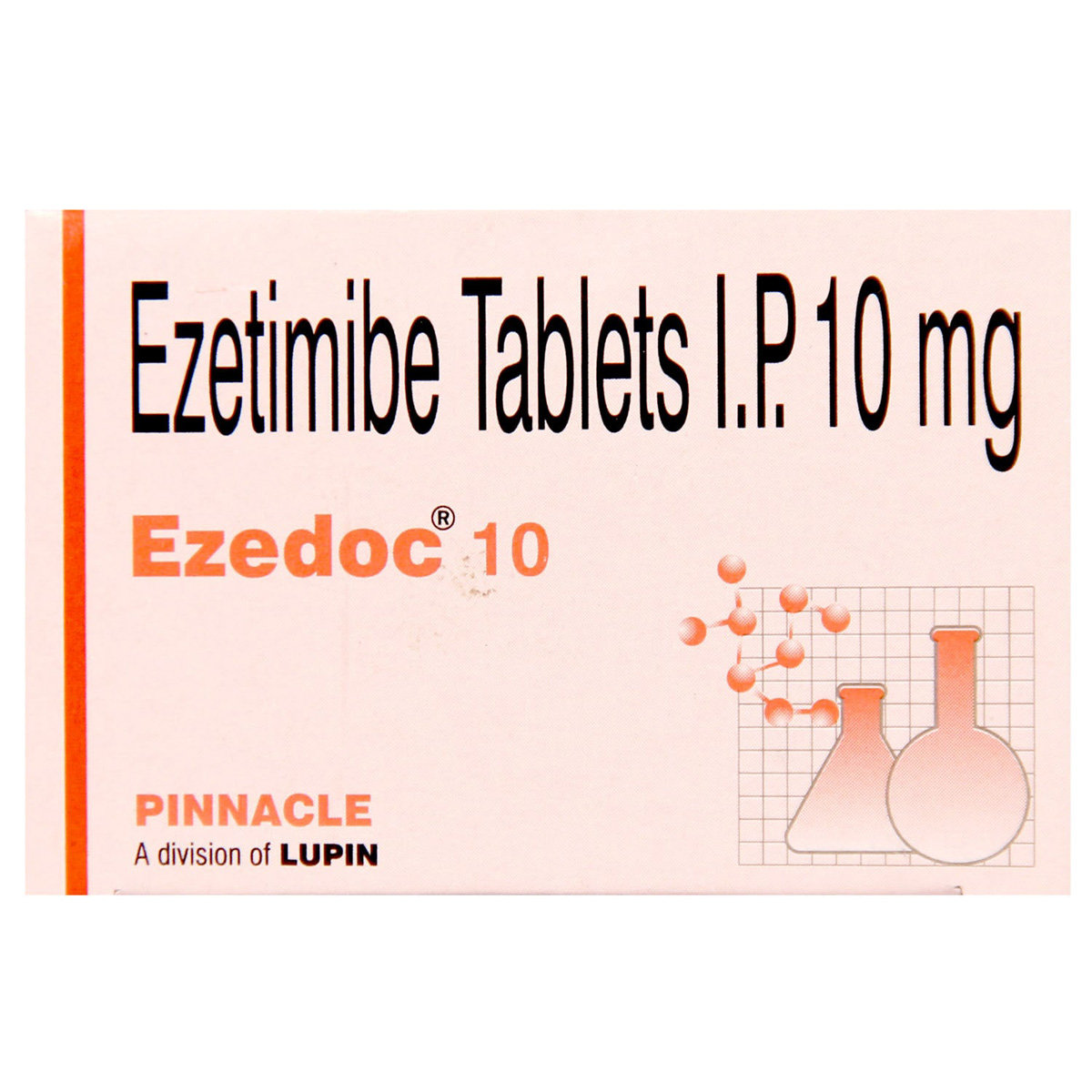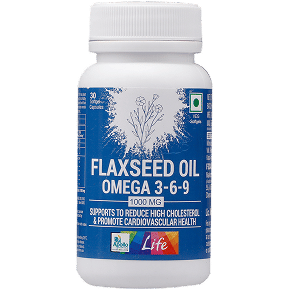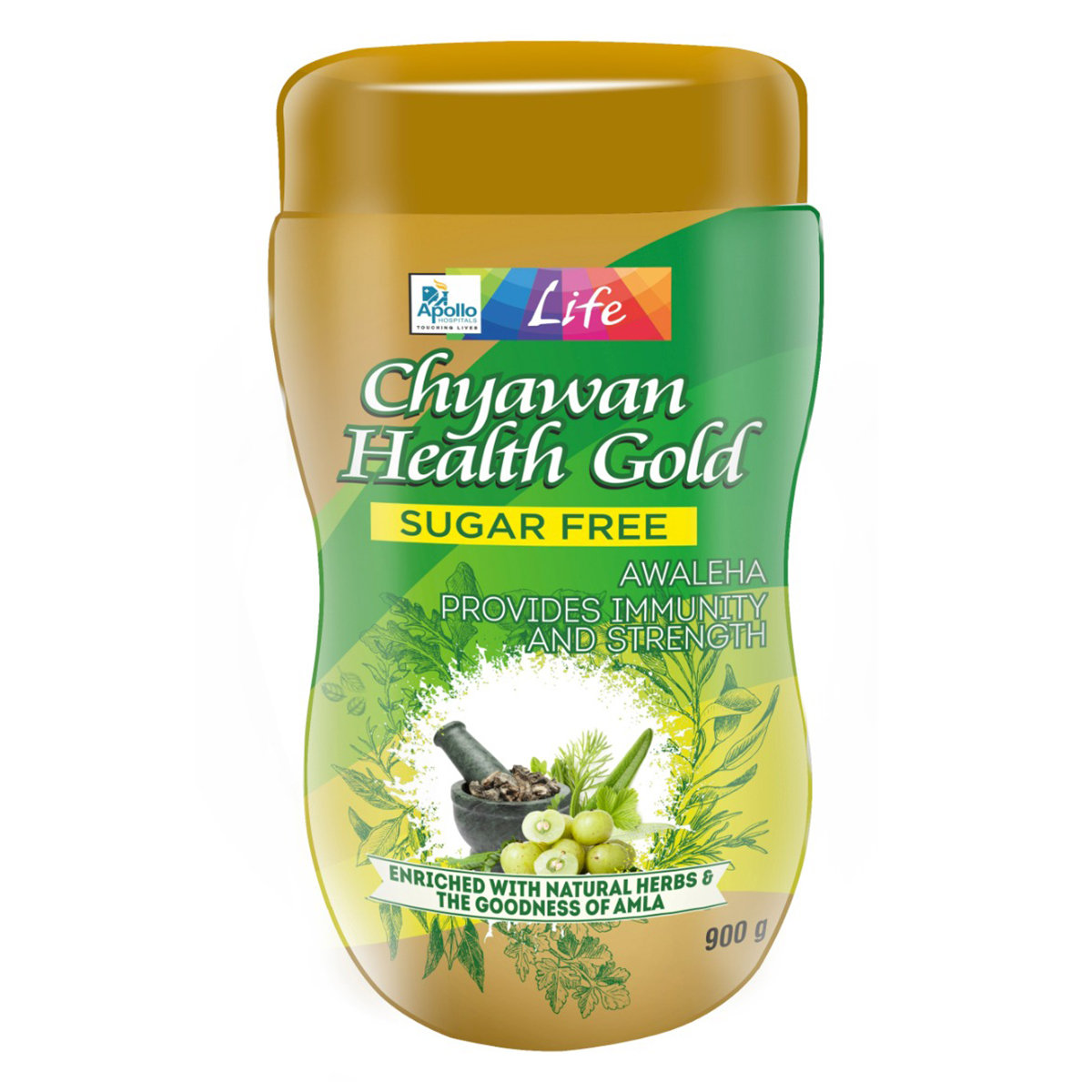Ezechol 10 Tablet
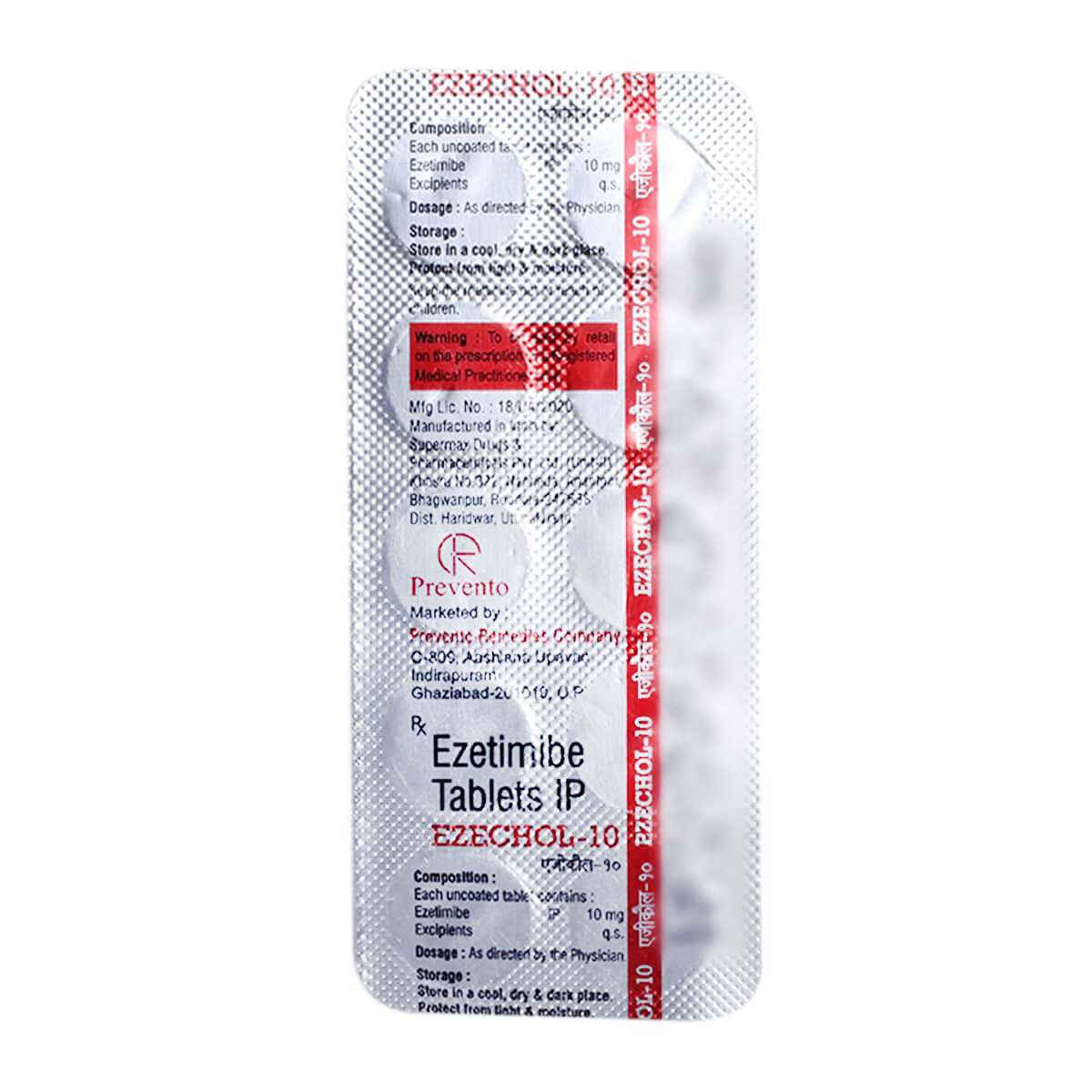
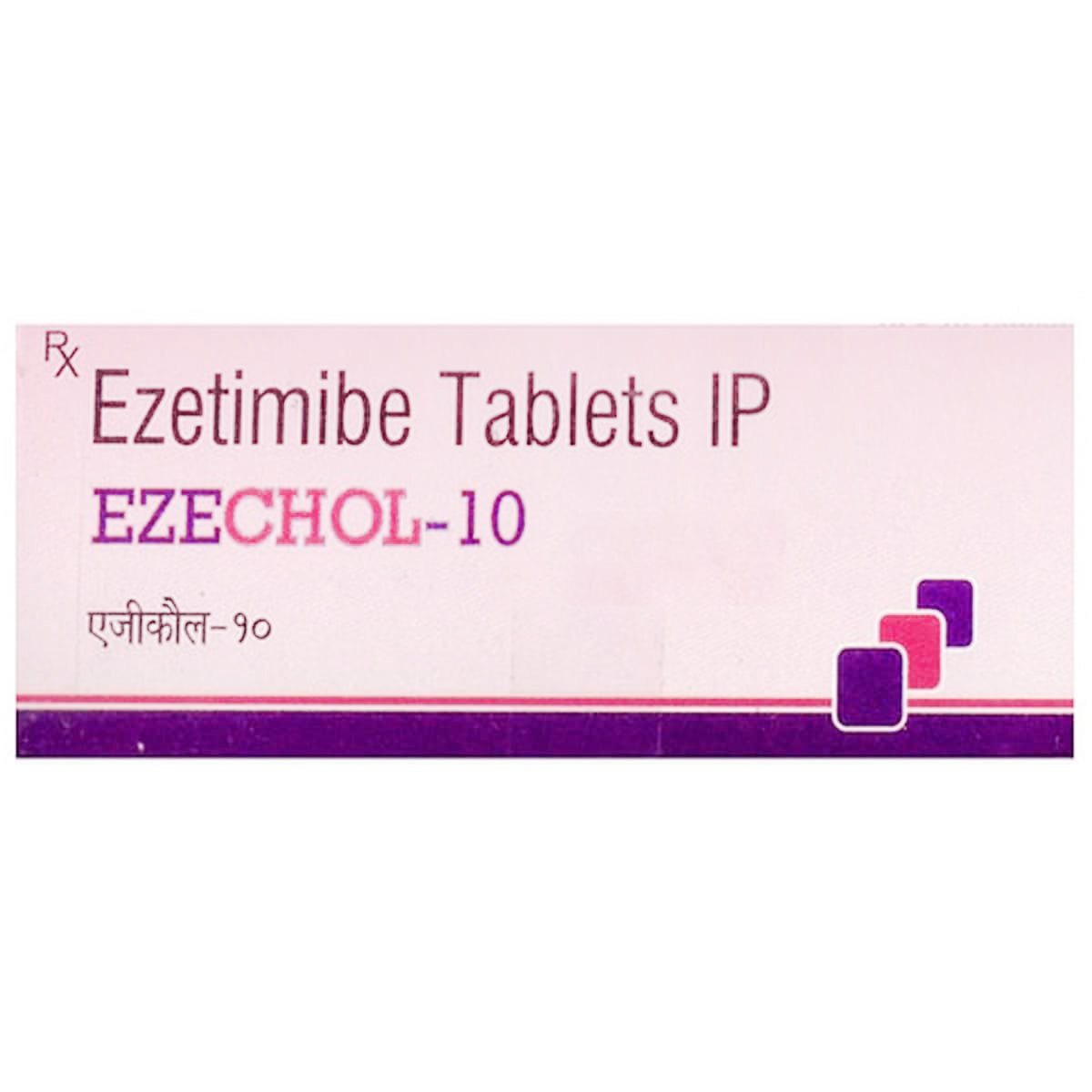
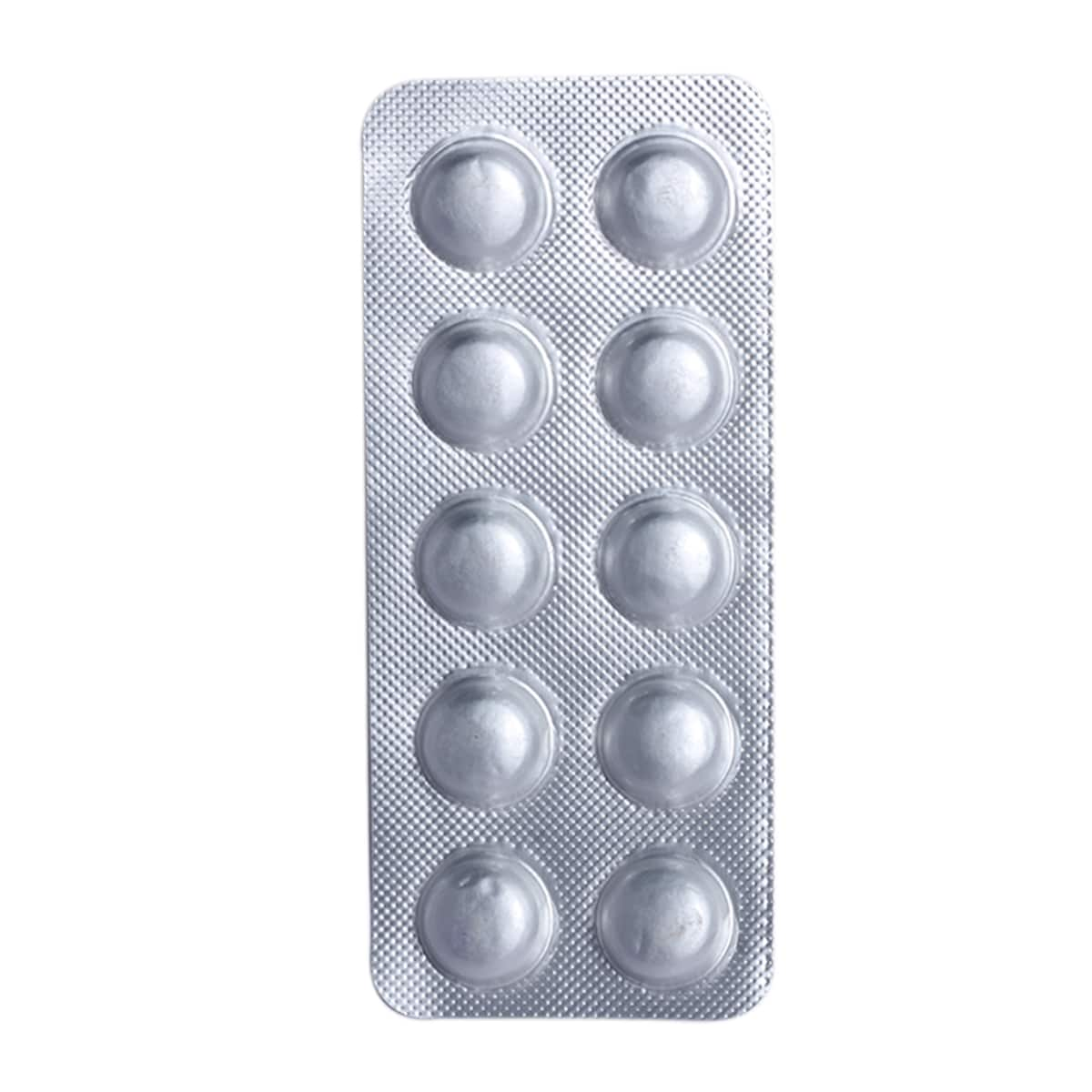
MRP ₹126.5
(Inclusive of all Taxes)
₹15.2 Cashback (12%)
know your delivery time
Provide Delivery Location
Composition :
Manufacturer/Marketer :
Consume Type :
Expires on or after :
Return Policy :

Secure Payment

Trusted by 8 Crore Indians

Genuine Products
Therapeutic Class
Country of origin
Manufacturer/Marketer address
Disclaimer
Alcohol
Safe if prescribed
Do not drink too much while taking Ezechol 10 Tablet . Drinking a lot of alcohol makes you more likely to get muscle and liver side effects.
Pregnancy
Consult your doctor
Please consult the doctor. There are no adequate and well-controlled studies on pregnant women. Your doctor will prescribe only if the benefits outweigh the risks.
Breast Feeding
Consult your doctor
Consult your doctor, and there is no substantial research yet on the use of Ezechol 10 Tablet in breastfeeding/nursing mothers. Your doctor will prescribe only if the benefits outweigh the risks.
Driving
Safe if prescribed
Ezechol 10 Tablet will not affect your ability to drive or operate machinery.
Liver
Consult your doctor
Ezechol 10 Tablet to be taken with caution, especially if you have had a history of liver disease. Your doctor will have to change the dosage depending on your medical condition and your reaction to treatment.
Kidney
Consult your doctor
Ezechol 10 Tablet to be taken with caution, especially if you have had a history of kidney disease. Your doctor will have to change the dosage depending on your medical condition and your reaction to treatment.
Children
Safe if prescribed
Ezechol 10 Tablet is not recommended for children below the age of 17 years.
Product Substitutes
About Ezechol 10 Tablet
Ezechol 10 Tablet belongs to the class of cholesterol-lowering medication primarily used to treat high cholesterol. Cholesterol is a waxy substance produced by the liver to protect nerves, make tissue, and various hormones. Our body also receives cholesterol from food, like cooking oils, eggs, meats, and dairy products. There are two types of cholesterol, namely 'bad cholesterol (low-density lipoprotein (LDL) and triglycerides (TG)) and 'good cholesterol (high-density lipoprotein (HDL)).
Ezechol 10 Tablet contains Ezetimibe, which is a cholesterol absorption inhibitor. It effectively lowers the amount of cholesterol in the blood by reducing cholesterol absorption in the intestine and lowering the level of bad cholesterol in the blood. Hence, reducing the chances of heart disease and making them healthier.
Take Ezechol 10 Tablet as prescribed by your doctor. Depending on your medical condition, you are advised to take Ezechol 10 Tablet for as long as your doctor prescribes it. The most common side effects of Ezechol 10 Tablet are abdominal pain, diarrhoea, flatulence, tiredness, joint pain, and respiratory tract infection. They do not require medical attention and gradually resolve over time. However, if the side effects are persistent, reach out to your doctor.
Ezechol 10 Tablet may cause a breakdown of skeletal muscle tissue, leading to kidney failure. This condition usually occurs in the elderly, people with kidney disease, and poorly controlled hypothyroidism (underactive thyroid). Ezechol 10 Tablet should not be prescribed to children less than ten years of age. You should contact a doctor before if you have had an allergic reaction to Ezechol 10 Tablet , have liver or kidney problems, pregnant or planning to get pregnant, are breastfeeding, have severe lung disease, or have a previous heart attack or stroke caused by bleeding in the brain, have hypothyroidism, drink more than two servings of alcohol per day and have a muscle disorder (fibromyalgia). The efficiency of Ezechol 10 Tablet can be increased by taking low-fat or cholesterol-containing food and drinks.
Uses of Ezechol 10 Tablet
Medicinal Benefits Mweb
Key Benefits
Ezechol 10 Tablet contains a cholesterol-lowering medication primarily used to treat high cholesterol. Cholesterol is a waxy substance produced by the liver to protect nerves, make tissue, and various hormones. Ezechol 10 Tablet contains Ezetimibe, which is a cholesterol absorption inhibitor. It effectively lowers the amount of cholesterol in the blood by reducing cholesterol absorption in the intestine and lowering the level of bad cholesterol in the blood. Hence, reducing the chances of heart disease and making them healthier.
Directions for Use
Side Effects of Ezechol 10 Tablet
- Abdominal pain
- Diarrhoea
- Flatulence
- Feeling tired
- Joint pain
- Respiratory tract infection
Drug Warnings
Do not take Ezechol 10 Tablet if you are allergic to Ezechol 10 Tablet or any of its ingredients. Ezechol 10 Tablet should not be taken if you have liver or kidney disease or myopathy (muscle disease). If you are taking Ezechol 10 Tablet with another cholesterol-lowering medication, especially statin, you should do a blood test to check liver enzymes. Do not take Ezechol 10 Tablet along with other cholesterol-lowering medicines (cholestyramine, colesevelam, colestipol); take it either 4 hours before or 2 hours after Ezechol 10 Tablet . To rule out any negative effects/interactions, keep your doctor informed about your health condition and all medications you take.
Drug-Drug Interactions
Drug-Drug Interactions
Login/Sign Up
Using clofibrate and Ezechol 10 Tablet may lead to the formation of gall stones.
How to manage the interaction:
Taking Ezechol 10 Tablet with Clofibrate together can result in an interaction, but it can be taken if a doctor has advised it. If you have any of these symptoms related to cholelithiasis, it's important to contact a doctor right away. Do not stop using any medications without talking to a doctor.
Combining Ezechol 10 Tablet with Pitavastatin can increase the risk of liver damage, and rhabdomyolysis (the breakdown of skeletal muscle tissue).
How to manage the interaction:
Taking Ezechol 10 Tablet with Pitavastatin together can possibly result in an interaction, but it can be taken if your doctor has advised it. However, if you experience symptoms like unexpected bruising or bleeding, skin rash, itching, exhaustion, nausea, vomiting, yellowing of the skin or eyes, unexplained muscular pain, tenderness, or weakness, fever, dark urine, chills, joint pain, or swelling, consult a doctor. Do not discontinue any medications without a doctor's advice.
Teriflunomide can cause higher levels of Ezechol 10 Tablet in the blood by reducing its excretion rate.
How to manage the interaction:
Taking Ezechol 10 Tablet with Teriflunomide together can result in an interaction, but it can be taken if a doctor has advised it. Do not discontinue any medications without consulting a doctor.
Pravastatin can cause higher levels of Ezechol 10 Tablet in the blood by reducing its excretion rate.
How to manage the interaction:
Co-administration of Ezechol 10 Tablet with Pravastatin can result in an interaction, but it can be taken if a doctor has advised it. Do not stop using any medications without a doctor's advice.
Taking Temsirolimus and Ezechol 10 Tablet can increase blood levels of cholesterol and triglycerides.
How to manage the interaction:
There may be a possibility of interaction between Ezechol 10 Tablet and Temsirolimus, but it can be taken if prescribed by a doctor. If you are taking sirolimus or temsirolimus along with your cholesterol-lowering medications, it is important to regularly check blood cholesterol and triglyceride levels with a doctor. Do not discontinue any medications without consulting a doctor.
Taking Lovastatin with Ezechol 10 Tablet may cause higher levels of Ezechol 10 Tablet in the blood.
How to manage the interaction:
Although taking Ezechol 10 Tablet and Lovastatin together can cause an interaction, it can be taken if a doctor has suggested it. Do not discontinue any medications without consulting a doctor.
When Ezechol 10 Tablet and Eluxadoline are taken together, the may increase the blood levels and effects of Ezechol 10 Tablet.
How to manage the interaction:
There may be a possibility of interaction between Ezechol 10 Tablet and Eluxadoline, but it can be taken if prescribed by a doctor. Do not discontinue any medications without consulting a doctor.
Using Ezechol 10 Tablet together with cerivastatin can increase the risk of side effects (liver damage and rhabdomyolysis - a condition that involves the breakdown of skeletal muscle tissue).
How to manage the interaction:
There may be a possibility of interaction between Ezechol 10 Tablet and Cerivastatin, but it can be taken if prescribed by a doctor. It's important to keep an eye on your health. If you notice any of these signs - like feeling achy, weak, or having a fever - it's a good idea to reach out to your doctor right away. Other symptoms to watch out for include dark urine, chills, joint pain, swelling, bruising, skin rash, itching, loss of appetite, fatigue, nausea, vomiting, or bleeding. Do not discontinue any medications without consulting a doctor.
When Ezechol 10 Tablet and Fluvastatin are taken together, the body may not get rid of Ezechol 10 Tablet as efficiently.
How to manage the interaction:
There may be a possibility of interaction between Ezechol 10 Tablet and Fluvastatin, but it can be taken if prescribed by a doctor. Do not stop using any medications without talking to a doctor.
Taking Ezechol 10 Tablet and Voclosporin may increase the blood levels and effects of Ezechol 10 Tablet.
How to manage the interaction:
Co-administration of Ezechol 10 Tablet with Voclosporin can result in an interaction, but it can be taken if a doctor has advised it. If you start or stop taking voclosporin, doctor may need to adjust the dose of other medications you are taking and keep an eye on your health and test results. If you notice any changes in your condition, make sure to contact a doctor right away." Do not discontinue any medications without consulting a doctor.
Drug-Food Interactions
Drug-Food Interactions
Login/Sign Up
Drug-Diseases Interactions
Drug-Diseases Interactions
Login/Sign Up
Drug-Drug Interactions Checker List
- CYCLOSPORINE
- WARFARIN
- PHENPROCOUMON
- FLUINDIONE
- ATORVASTATIN
- ROSUVASTATIN
- SIMVASTATIN
- ASPIRIN
Habit Forming
Special Advise
- A blood test is important to monitor liver enzymes if you are taking Ezechol 10 Tablet along with a statin.
Diet & Lifestyle Advise
- Try aromatherapy, yoga, and meditation to help relax your body and mind.
- Try to do breathing exercises to get more oxygen.
- Eat a healthy diet rich in soluble fibre like beans, legumes, whole grains, flax, apples, and citrus fruits.
- Try to replace most of your saturated fats with unsaturated fats that can reduce total cholesterol and LDL cholesterol quickly. Foods like avocados, olive oil, fatty fish, and nuts contain many heart-healthy unsaturated fats, so it’s beneficial to eat them regularly.
- Try to adopt a Mediterranean-style diet rich in olive oil, fruits, vegetables, nuts, whole grains, and fish, low in red meat and most dairy.
- Try to give priority to more fruits and veggies in your daily meal as these contain antioxidants that help to lower LDL
- Minimize the intake of added sugar. The American Heart Association (ADA) recommends one should not eat more than 100 calories (25 grams) of added sugar for women and children and no more than 150 calories (37.5 grams) for men every day.
- American Heart Association recommends sodium chloride intake (table salt) should not exceed more than 2,300 mg per day as part of a healthy eating pattern.
- As a precautionary measure, do not consume alcohol and quit smoking.
All Substitutes & Brand Comparisons
RX
Out of StockEzetimide 10mg Tablet
Lupin Ltd
₹69.71
(₹6.27 per unit)
43% CHEAPERRX
Out of StockEzlip 10mg Tablet 10's
East West Pharma India Pvt Ltd
₹74
(₹6.66 per unit)
40% CHEAPERRX
Out of StockEzewin 10mg Tablet
Ikon Remedies Pvt Ltd
₹95
(₹8.55 per unit)
23% CHEAPER

Have a query?
Buy best Cardiology products by
Torrent Pharmaceuticals Ltd
Sun Pharmaceutical Industries Ltd
Lupin Ltd
Intas Pharmaceuticals Ltd
Cipla Ltd
Micro Labs Ltd
Macleods Pharmaceuticals Ltd
Abbott India Ltd
Ajanta Pharma Ltd
Ipca Laboratories Ltd
Eris Life Sciences Ltd
Mankind Pharma Pvt Ltd
Lloyd Healthcare Pvt Ltd
Dr Reddy's Laboratories Ltd
Glenmark Pharmaceuticals Ltd
Emcure Pharmaceuticals Ltd
Alembic Pharmaceuticals Ltd
Alkem Laboratories Ltd
East West Pharma India Pvt Ltd
USV Pvt Ltd
Zydus Healthcare Ltd
Aristo Pharmaceuticals Pvt Ltd
Elbrit Life Sciences Pvt Ltd
J B Chemicals & Pharmaceuticals Ltd
Zydus Cadila
Akumentis Healthcare Ltd
Alteus Biogenics Pvt Ltd
Hbc Life Sciences Pvt Ltd
Fusion Health Care Pvt Ltd
Troikaa Pharmaceuticals Ltd
La Renon Healthcare Pvt Ltd
Corona Remedies Pvt Ltd
Jubilant Lifesciences Ltd
Medley Pharmaceuticals Ltd
Knoll Healthcare Pvt Ltd
Msn Laboratories Pvt Ltd
Zuventus Healthcare Ltd
Cadila Pharmaceuticals Ltd
Blue Cross Laboratories Pvt Ltd
Lividus Pharmaceuticals Pvt Ltd
Morepen Laboratories Ltd
Ranmarc Labs
Shrrishti Health Care Products Pvt Ltd
Sanofi India Ltd
Steris Healthcare
Elder Pharmaceuticals Ltd
Primus Remedies Pvt Ltd
Unison Pharmaceuticals Pvt Ltd
Eswar Therapeutics Pvt Ltd
Knoll Pharmaceuticals Ltd
Tas Med India Pvt Ltd
Systopic Laboratories Pvt Ltd
Indiabulls Pharmaceuticals Pvt Ltd
Leeford Healthcare Ltd
Sinsan Pharmaceuticals Pvt Ltd
Biochem Pharmaceutical Industries Ltd
Cadila Healthcare Ltd
Azkka Pharmaceuticals Pvt Ltd
Nirvana India Pvt Ltd
Orsim Pharma
Prevego Healthcare & Research Pvt Ltd
Econ Healthcare
Elinor Pharmaceuticals (P) Ltd
FDC Ltd
Sunij Pharma Pvt Ltd
Nicholas Piramal India Ltd
Astra Zeneca Pharma India Ltd
Pfizer Ltd
Lia Life Sciences Pvt Ltd
Shine Pharmaceuticals Ltd
Elicad Pharmaceuticals Pvt Ltd
Indoco Remedies Ltd
Proqol Health Care Pvt Ltd
Vasu Organics Pvt Ltd
Biocon Ltd
Opsis Care Lifesciences Pvt Ltd
Johnlee Pharmaceuticals Pvt Ltd
Merck Ltd
Wockhardt Ltd
Auspharma Pvt Ltd
Ergos Life Sciences Pvt Ltd
Lakshya Life Sciences Pvt Ltd
Ordain Health Care Global Pvt Ltd
Pficus De Med Pvt Ltd
ALICAN PHARMACEUTICAL PVT LTD
RPG Life Sciences Ltd
Glynis Pharmaceuticals Pvt Ltd
Orris Pharmaceuticals
Samarth Life Sciences Pvt Ltd
Aprica Pharmaceuticals Pvt Ltd
Aretaeus Pharmaceuticals Pvt Ltd
Koye Pharmaceuticals Pvt Ltd
Neocardiab Care
Retra Life Science Pvt Ltd
Alniche Life Sciences Pvt Ltd
Alvio Pharmaceuticals Pvt Ltd
Arkas Pharma Pvt Ltd
Atos Lifesciences Pvt Ltd
Divine Savior Pvt Ltd
Metalis Lifesciences Pvt Ltd
Customers Also Bought


